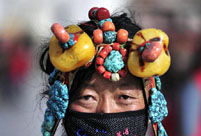 Amazing cliff diving in cold winter
Amazing cliff diving in cold winter
 Enjoy Sochi 2014 in slow motion
Enjoy Sochi 2014 in slow motion
 University student sentenced to death for poisoning roommate
University student sentenced to death for poisoning roommate
 Chinese lunar New Year celebrated in San Francisco
Chinese lunar New Year celebrated in San Francisco
 Taiwan Lantern Festival 2014
Taiwan Lantern Festival 2014
 Haiyang Yangge: make up
Haiyang Yangge: make up
 China's top 10 richest cities
China's top 10 richest cities
 President Xi visits garrison troops in Inner Mongolia
President Xi visits garrison troops in Inner Mongolia
 Turnip sculptures amaze tourists in Qingdao
Turnip sculptures amaze tourists in QingdaoBEIJING, Feb. 21 -- Students of Tsinghua University Primary School in Beijing know all about China's drive to improve its citizens' etiquette as they get used to a new requirement to bow when meeting teachers and parents on campus.
The prestigious school enforced the rule to answer government calls to educate children with a set of moral principles, namely "core socialist values." This doctrine has been encouraged by the Communist Party of China (CPC) since its 18th Party Congress in November 2012, but the campaign has ramped up this week since a renewing address by Chinese President Xi Jinping.
On Monday morning, the first day of the school semester, a ceremony was held in the biting cold of the playground. More than 1,600 students in uniform bowed to teachers simultaneously and the latter responded in kind.
"Core socialist values include patriotism and friendship. We help our children start with bowing, a practice to show respect and one that is valued by our traditional culture," Principal Dou Guimei told local media.
The move epitomized a nationwide campaign to rebuild faith amid concerns that the world's second-largest economy has to some extent lost its moral compass, a price paid for its three-decade economic miracle.
A "moral vacuum" has been perceived in private and public life, exemplified by pervasive money worship and extreme individualism, as well as endless scandals concerning corruption, food safety and environmental pollution.
In addition, a spate of violence and molestation against children, with some cases perpetrated by teachers and public servants, has prompted rounds of soul-searching among the public.
The latest instruction on reclaiming the moral high ground was delivered by Xi, general secretary of the CPC Central Committee, on Monday, when he called for greater efforts to set up a socialist value system with Chinese characteristics in line with a new era.
The 18th Party Congress specified core socialist values as prosperity, democracy, civility, harmony, freedom, equality, justice, the rule of law, patriotism, dedication, integrity and friendship.
In December, the CPC issued a detailed guideline on bolstering these values, ordering them to be incorporated into the school curriculum, urging media to spread moral righteousness and prodding Party members and officials to take the lead in practicing the principles.
The targets of the guideline have sprung into action. For example, TV stations across China have devoted considerably more air time to public service advertisements and broadcasts championing social values. Local governments have moved to reward Good Samaritans to inspire more good deeds.
Moreover, the ruling party has beefed up its anti-corruption campaign, vowing to crack down on both high-ranking and low-level corrupt officials -- "tigers" and "flies," as Xi put it.
In 2013, a total of 31 high-profile officials were investigated by the the CPC Central Commission for Discipline Inspection. And about 182,000 officials were punished by the CPC's discipline inspection agencies nationwide.
While vigorously pitching the core values, the CPC hopes to provide Chinese people with moral support, as part of its efforts to realize the Chinese dream of national rejuvenation and the goal of building "a moderately prosperous society in all respects," said Liu Jingbei, a professor with the China Executive Leadership Academy at Pudong, Shanghai.
Yang Hengjun, a writer and commentator, likened a country without core values to "creatures without souls."
For a giant nation like China, consensus can only be forged if it has a set of core values accepted by both rulers and the public, Yang said in a blog article published in January.
Once serving as the code of conduct in ancient China, Confucian doctrines were denounced a century ago by some intellectuals who regarded the time-honored thoughts as pedantic and outdated.
Anti-Confucius sentiment later climaxed during the Cultural Revolution, and the old sage has never recovered his former glory.
But in fact, nowadays many Chinese people resent widespread vulgar values and welcome specific principles of moral conduct, said Xin Ming, a professor with the Party School of the CPC Central Committee.
However, the CPC would find it extremely difficult to press the whole of society to internalize the values it put forward, as Chinese have embraced diversified thought along with China's economic liberalization that began 35 years ago, warned Zheng Changzhong, an associate professor with Fudan University's School of International Relations and Public Affairs.
"We should be aware that there would be a long, bumpy road from establishing the values to making them adopted by all," Yang said. "And that won't happen overnight."
 Most gorgeous female celebs in Chi-pao
Most gorgeous female celebs in Chi-pao Second round of test kicks off at Beijing Film Academy
Second round of test kicks off at Beijing Film Academy Ancient Qiang people had vertically grown teeth
Ancient Qiang people had vertically grown teeth Top 10 Chinese youth’s favorite seaside destinations
Top 10 Chinese youth’s favorite seaside destinations Traditional Tibetan clothing tailors
Traditional Tibetan clothing tailors In photos: Unveiling Taishan station
In photos: Unveiling Taishan station Beautiful moments of family reunion
Beautiful moments of family reunion 10 Valentine's Day ideas for couples
10 Valentine's Day ideas for couples Let's get married today!
Let's get married today! Chinese warplanes C919 to appear at Singapore Airshow 2014
Chinese warplanes C919 to appear at Singapore Airshow 2014 Ruins of Shang Dynasty's structure unearthed in Shaanxi
Ruins of Shang Dynasty's structure unearthed in Shaanxi  Intercity high speed train in operation
Intercity high speed train in operation Severe coldness freezes large parts of China
Severe coldness freezes large parts of China  Beautiful moments of Sochi
Beautiful moments of Sochi  It's not just performing this year
It's not just performing this yearDay|Week|Month